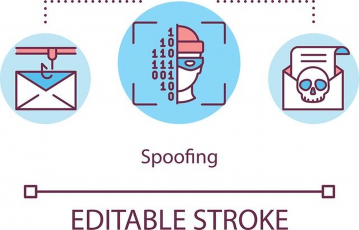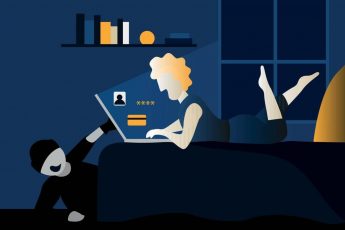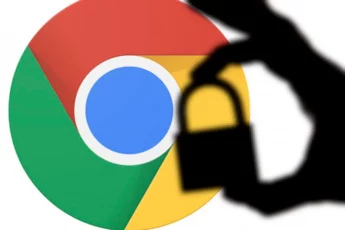A free WiFi connection is considered a luxury when you travel abroad and don’t want to subscribe to international roaming and mobile data. Yes, without WiFi, you might feel detached and unattended. But are you sure the wireless hotspot provided in your hotel room is safe and reliable to use?
By using unsecured WiFi, there’s a chance that you might end up exposing your bank accounts or your identity being stolen by a cyber-identity thief.
A few years back, you would only need to keep your wallet protected from thieves and secure your password while going out. Or, additionally, people had to make sure they do not lose their credit cards. Yes, that all is still essential.
But traveling today also requires you to keep yourself protected when using public WiFi. That pretty much justifies why people keep asking ‘Is hotel WiFi safe?’
It indeed is a legitimate query to make. This article will explain why hotel WiFi is not safe to use and what can you do to use any public WiFi safely. That includes the airport WiFi network, WiFi at cafes, and hotel WiFi hotspots.
The hidden deal behind free public WiFi connections
While traveling abroad due to office work or going out with family, it’s natural for people to visit shop malls and cafes. Free WiFi hotspot is probably what most of the visitors ask cafe owners first of all. Free WiFi is an absolute luxury when visiting foreign countries, both for office trips and family vacations.
According to some surveys, many tourists consider fast wireless internet facilities more vital than hotel laundry service, catering, or location. Nowadays, almost all hotels worldwide provide free WiFi access to their guests and market themselves with this specific facility.
However, the convenience of browsing the internet and streaming Netflix while relaxing in your hotel room has its price: a potential risk of cyber-attacks.
Is hotel WiFi a secure connection?
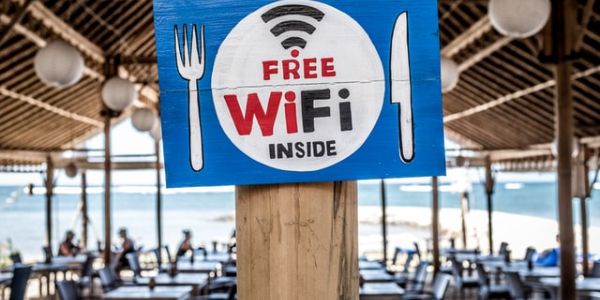
As noted earlier, hotel WiFi security is inefficient, and hackers can easily exploit it. The lack of proper security is because your hotel’s main aim is to provide you a friendly and comfortable environment, and not stealthy cybersecurity.
Hotel management puts little or no effort into protecting their ‘open to all‘ WiFi networks.
While getting free access, guests are asked to create a log in password and username. Most guests enter their room or contact number, and a password gets created for that specific login device. The entire responsibility for the overall network security is one weak password, which practically is the same as having no password.
Many hotels entirely skip the authentication procedure, allowing malicious traffic from anyone or anywhere to connect to their free WiFi network. With the weak implementation and irregular monitoring of firewalls and improper data security, wireless networks remain vulnerable to malicious identity theft, cyber-attacks, and data leaks.
The biggest threat to your privacy is a cyber hacker’s ability to establish a silent bypass medium between your device and the WiFi access point. The user’s screen, notification, and activity are visible to the hacker, which he can intervene.
Is hotel WiFi reliable for banking transactions?
Free and unsecured WiFi connections are not recommended for banking transactions. If you have connected to unsecured WiFi, there is a high chance of your online activities getting monitored by hostile third parties, commonly known as cyber hackers.
Consequently, anyone who manages to intervene in an unsecured hotel WiFi connection can fetch your private data. That includes photos and other data on your device, login credentials, financial accounts history, and other personal information.
Unless you have not subscribed to a reliable VPN such as ExpressVPN or NordVPN and installed it on your device, don’t try to access your bank or other sensitive accounts on WiFi. In essence, avoid any online transaction while on a hotel WiFi unless you have proper protection.
Is there a possibility to stay protected on a hotel’s free WiFi connection?

Since hotel WiFi security is inefficient, it depends on you to protect yourself from any possible data hack or cyber-attack. Users should be firmly aware of potential risks to their privacy before using an unsecured WiFi connection like the ones offered by hotels.
If the network is left unsupervised, cybercriminals can easily invade your privacy and manipulate private and vital data.
Users must refrain from accessing their online bank and financial accounts. Mobile data and roaming are likely to cost little but will keep your financial assets and vulnerable data safe.
Luckily, staying protected on a hotel WiFi does not require a fortune or too much of your time. All you need is to use some common sense and get your hands on a quality VPN.
VPN to the rescue
Never connect to a new network recklessly. Hackers tend to create false hotspots to attract users into thinking they are legitimate. And if you find two similar WiFi names, don’t click randomly; inquire hotel staff about their official WiFi network.
Another thing you should consider doing is always enable a firewall on your device. A reliable firewall maintains an encrypted defense mechanism throughout your internet connection. That helps to make the information transition secure even on hotel WiFi. And of course, having quality antivirus software installed on your device is a no brainer.
But there is a critical tool that not many use or even have enough awareness about. It’s VPN.
To have stealthy security on WiFi connections such as your hotel’s, it’s essential to encrypt your internet traffic data. VPNs offer simple encryption providing a safe virtual passage to access data online. Having a reliable VPN helps you to stay safe from hackers and malicious activities on unsecured WiFi connections. It’s the quickest way to stay protected when using hotel WiFi. Let’s cover it in a bit further detail below.
What is a VPN?
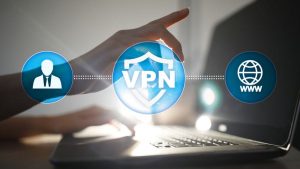
A VPN allows you to have a secure interconnection to another network over the internet. VPNs can let you unblock and access any content anytime, anywhere. It also protects your browsing activity from leaking over public WiFi connections.
In essence, in the modern tech world, VPN is a piece of ninja software that routes your IP address and ciphers all of your internet traffic.
Enabling a VPN improves online privacy, provides a more secure environment, and helps users bypass web censored contents blocked by the government, ISPs, or any other organization or admin blocking websites.
Let it be Netflix, Hulu, Disney+, HBO, BBC iPlayer, Amazon Prime Video, Sky TV, ITV Hub, or any streaming portal, you can unblock them all with a VPN. Along with Netflix and other streaming portals, a VPN can also help you unblock websites that are entirely region-based.
But keep in mind, not all VPNs perform equally well.
For stealthy hotel WiFi security, we recommend settling only with quality VPNs such as ExpressVPN or NordVPN.
Having a top VPN activated on your device will help make your hotel WiFi connection secure and private by encrypting your information. That ultimately will make sure your private information does not get spied on by hackers or any third-party.
How a VPN protects your data?
- Masking digital identity and location: VPNs mask your identity and location so the hackers cannot track you down or digitally stalk you. It hides your IP address, making your data more secure and protected. In essence, a VPN not only blocks all the third-parties on the internet from tracking your location.
- Encryption: VPNs encrypt your data, transforming search history, browsing, and personal data into a code that no unauthorized person can access. This encryption puts you at peace with your data security and protection.
- Secure online connections: In addition to several other benefits, a VPN also secures your online connections making your personal information and documents safe and protected. We all know that public WiFis can never be trusted because any hacker or stalker can hack their way into your device and steal data. But a VPN ensures it does not happen. Being dependent on public WiFi while using VPN ensures your data’s safety at all times. It will secure your online passwords, credit card, banking details, and email addresses.
- Safe torrenting: Torrenting has become quite common nowadays, thanks to the availability of free and high-quality downloadable content. However, the authenticity of downloaded content cannot be ensured, and these files can often contain viruses. VPN can be the ultimate solution to provide you with secure torrenting. It must be noted that torrenting is illegal, so you can be in trouble if your IP address and location becomes accessible. So better use VPN to avoid such situations and keep your data and device protected.
- Kill switch feature: Most of the top VPNs out there today also have a feature named the ‘kill switch.’ It disconnects your internet if the VPN faces any tiny glitch or stops working even for a second or two. Disconnecting the internet will automatically cut your device’s connection to the web, so no hacker could sneak their way around your firewall if the VPN faces a temporary glitch. The kill switch feature makes sure your privacy does not get compromised.
- One account, multiple devices: On average, one VPN account allows the safety and protection of more than six devices. Some providers even offer unlimited simultaneous connections. That means you can protect multiple devices (let them be yours or someone from the family) by paying only for one account.
Why you need a VPN subscription while globe-trotting?

When globe-trotting and staying in hotels with non-monitored WiFi connections, you are always at a risk of exploiting your identity and data theft.
Therefore, a secure VPN service is recommended, which acts as a virtual shield when you avoid using mobile data subscriptions and protects you from getting exposed to third-party intervention.
But did you know that VPNs bring you added benefits alongside security?
Added benefits with the VPN app on your device
Below are some of the additional benefits VPNs provide on top of keeping you safe online:
- Stream content: A VPN will let you watch your favorite shows and stream Netflix in your hotel room. Change your IP country to any country you want and enjoy geo-restricted news, media, and sports content while away from home. Simple.
- Ultimate internet freedom: Thanks to VPNs, users can enjoy ultimate internet freedom, scroll through social media platforms like Facebook or Twitter regardless of their location at a time.
- Ads blocking: Best VPNs available today block annoying ads and pop-ups that keep coming up while you consume any type of content online. When on unsecured WiFi networks such as a hotel’s, impersonators can infect your device with malicious ads known as malvertising. A VPN helps you avoid such hazards without you having to do anything.
- Masks your identity virtually: You can create a virtual identity for yourself from anywhere you want by simply connecting to a VPN server of your choice.
- Safe and encoded browsing history: VPN secures and filters both your incoming and outgoing internet traffic with military-grade stealthy encryption, shielding you against hackers and cyber threats. It is said that the most advanced technology, a supercomputer, would take billions of years to crack the level of VPN security.
What if I decide not to take precautions when on hotel WiFi
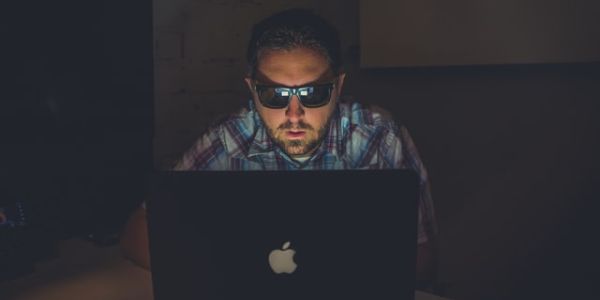
The biggest risk that you run through by not using a VPN and being careless when using your hotel WiFi is hackers successfully hacking into your devices. While once in, a hacker can do multiple things to your device, but below we list two most devastating ones:
Stealing your identity and passwords
Given that a hacker has got hold of your device, whenever you onto social media sites or other sensitive portals such as intern banking websites, hackers snoop and collect your login details.
What can happen afterward is an easy guess. You can end up exposing your personality as well as financial information to strangers. Remember, your finances and bank accounts are always at risk if your privacy and identity get compromised.
Infecting your computer with viruses
Smart hackers just don’t rely on data monitoring or stealing your login credentials. Hackers can also tend to send malware files to users’ laptops, Android/iOS-based smartphones, or other connected devices. Doing so helps them infect users’ tech belongings and use them for any of their malicious purposes.
Here, on top of using a VPN, we would recommend you to refrain from downloading content from unknown sites as viruses could be transferred via WiFi access points.
Remember, unless you have proper protection, you and your identity are at risk while using a public WiFi connection. That stands true even if you don’t visit any financial site or log into portals requiring your login credentials.
Conclusion
You see, VPN provides secure and reliable protection, which has a reach far beyond an unsecured WiFi. By merely enabling a VPN on your device, you can start doing all your activities on hotel WiFi securely. But one thing worth noting here is, you must subscribe to only the best VPN service out there.
Also, if you cannot subscribe to a VPN service for any reason but still need to use public WiFi during your family vacations or official trips, remember the following tips to keep yourself as much protected as possible:
- Check your device’s security settings
- Change your passwords time-to-time throughout your tour
- Avoid opening sensitive sites (such as your internet banking portal)
- Carefully review URLs of the websites you visit (make sure you are surfing only the HTTPS-enabled sites)
Apart from following the above-provided tips, you could also use your mobile data or smartphone’s WiFi hotspot feature to tether your laptop to your mobile. That way data will be sent over your mobile data, where it’s less vulnerable to snooping compared to hotel WiFi. But understandably, while this solution works, it would use up your precious mobile data allowance.
